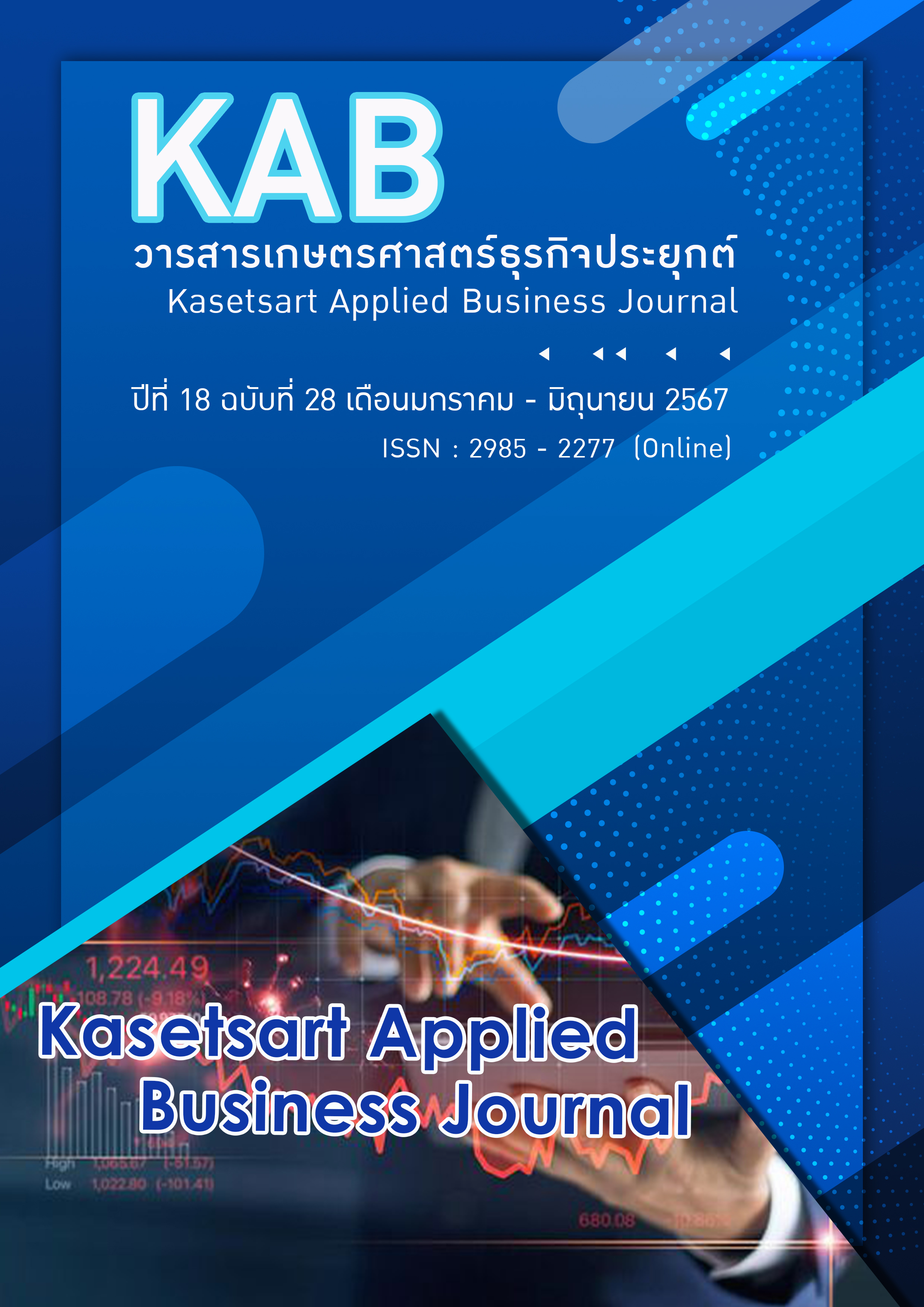Political Uncertainty, Corporate Investment Decision and Firm Performance: Empirical Evidence from Thailand
Main Article Content
Abstract
The objectives of this study are to investigate the impact of political uncertainty on corporate investment decision and on firm performance. We applied the Thai political uncertainty index constructed by Luangaram and Sethapramote (2018) to quantify the political risk. The results revealed that political uncertainty is negatively related to corporate investment level as well as the firm performance. In addition, corporate investment level was positively associated with firm characteristics such as financial constrain measured by operating cash flows, and growth opportunities measured by year-on-year sales growth, and Tobin’s Q. Despite there were negative impacts of macroeconomic factors on corporate investment, the impacts on firm performance were inconclusive. Overall, our results lend empirical support to the hypothesis that political uncertainty can weaken economic growth through a reduction in corporate investment in real sector. Moreover, the political uncertainty has negative impact on firm performance. This decrease is related to precautionary delays in investment until the validity of related policies is implemented. Meanwhile, the political uncertainty also possibly affects the demand for consumption which potentially impact the firm performance.
Article Details

This work is licensed under a Creative Commons Attribution-NonCommercial-NoDerivatives 4.0 International License.
Journal of TCI is licensed under a Creative Commons Attribution-NonCommercial-NoDerivatives 4.0 International (CC BY-NC-ND 4.0) licence, unless otherwise stated. Please read our Policies page for more information...
References
พัศวีร์ เจียมสุชน. (2562). ความไม่แน่นอนทางการเมืองและโครงสร้างการเงินของกิจการ [การค้นคว้าอิสระ].มหาวิทยาลัยธรรมศาสตร์. https://digital.library.tu.ac.th/tu_dc/frontend/Info/item/dc:176434
ยุทธนา เศรษฐปราโมทย์. (2564). ผลของปัจจัยเสี่ยงเชิงนโยบายเศรษฐกิจและการเมืองต่อการเติบโตทางเศรษฐกิจและผลตอบแทนตลาดหลักทรัพย์ในประเทศไทย. วารสารเกษตรศาสตร์ธุรกิจประยุกต์, 15(23), 99-120.
An, H., Chen, Y., Luo, D., & Zhang, T. (2016). Political uncertainty and corporate investment: evidence from China. Journal of Corporate Finance, 36, 174-189.
Apaitan, T., Luangaram, P., & Manopimoke, P. (2022). Uncertainty in an emerging market economy: evidence from Thailand. Empirical Economics, 62, 933-989.
Attig, N., Ghoul, S. E., Guedhami, O., & Zheng, X. (2021). Dividends and economic policy uncertainty: International evidence. Journal of Corporate Finance, 66. https://doi.org/10.1016/j.jcorpfin.2020.101785
Azzimonti, M. (2018). Partisan conflict and private investment. Journal of Monetary Economics, 93, 114–131.
Baker, S. R., Bloom, N., & Davis, S. J. (2016). Measuring economic policy uncertainty. The Quarterly Journal of Economics, 131(4), 1593-1636.
Bernanke, B. S. (1983). Irreversibility, uncertainty, and cyclical investment. The Quarterly Journal of Economics, 98(1), 85-106.
Cai, Y., & Menegaki, A. (2021). FDI, growth and trade partisan conflict in the US: TVP-BVAR approach. Empirical Economics, 60, 1335-1362.
Caldara, D., & Iacoviello, M. (2022). Measuring geopolitical risk. American Economic Review, 112(4), 1194-1225. https://doi.org/10.1257/aer.20191823
Caldara, D., Iacoviello, M., Molligo, P., Prestipino, A., & Raffo, A. (2020). The economic effects of trade policy uncertainty. Journal of Monetary Economics, 109, 38-59.
Carrol, C. D., & Kimball, M. S. (1996). On the concavity of the consumption function. Econometrica, 64(4), 981-992.
Cheng, C. H. J., Chiu, C.-W., Hankins, W. B., & Stone, A.-L. (2018). Partisan conflict, policy uncertainty and aggregate corporate cash holdings. Journal of Macroeconomics, 58, 78-90.
Colak, G., Durnev, A., & Qian, Y. (2017). Political uncertainty and IPO activity: evidence from U.S. Gubernatorial elections. Journal of Financial and Quantitative Analysis, 52(6), 2523-2564.
Demir, E., & Ersan, O. (2017). Economic policy uncertainty and cash holdings: Evidence from BRIC countries. Emerging Markets Review, 33, 189-200.
Feng, X., Luo, W., & Wang, Y. (2023). Economic policy uncertainty and firm performance: evidence from China. Journal of the Asia Pacific Economy, 28(4), 1476-1493. https://doi.org/10.1080/13547860.2021.1962643
Gugler, K. P., Mueller, D. C., & Yurtoglu, B. B. (2004). Corporate governance and the returns on investment. The Journal of Law and Economics, 47(2), 589-633.
Gulen, H., & Ion, M. (2016). Policy uncertainty and corporate investment. The Review of Financial Studies, 29(3), 523-564.
Henisz, W. J. (2002). Politics and international investment: Measuring risks and protecting profits. Edward Elgar.
Iqbal, U., Gan, C., & Nadeem, M. (2020). Economic policy uncertainty and firm performance. Applied Economic Letter, 27(10), 765-770.
Julio, B., & Yook, Y. (2012). Policy uncertainty and corporate investment cycles. The Journal of Finance, 67(1), 45-83.
Khanthavit, A. (2019). The Thai bond market’s behavior in the time surrounding military coups. Thammasat Review, 22(1), 1-23.
Khanthavit, A. (2020). An event study analysis of Thailand’s 2019 general election: A long window of multiple sub-events. International Journal of Financial Research, 11(4), 502-514.
Kimbell, M. S. (1990). Precautionary saving and the marginal propensity to consume. NBER Working Papers 3403, National Bureau of Economic Research, Inc. https://www.nber.org/papers/w3403
Liu, G., & Zhang, C. (2020). Economic policy uncertainty and firms’ investment and financing decision in China. China Economic Review, 63. https://doi.org/10.1016/j.chieco.2019.02.007
Luangaram, P., & Sethapramote, Y. (2018, May). Economic impacts of political uncertainty in Thailand. (PIER Discussion Papers, No.86). https://www.pier.or.th/en/dp/086/
Luangaram, P., & Sethapramote, Y. (2020). Capital flows and political conflicts: evidence from Thailand. The Economics of Peace and Security Journal, 15(2), 83-100.
Lumjiak, S., Quang. N. T. T., Gan, C., & Treepongkaruna, S. (2018). Good coups, bad coups: evidence from Thailand’s financial markets. Investment Management and Financial Innovations, 15(2), 68-86.
Lumjiak, S., Treepongkaruna, S., Wee, M., & Brooks, R. D. (2014). Thai financial markets and political change. Journal of Financial Management, Markets and Institutions, 2(1), 5-26.
Nimkhunthod, W. (2007). An impact of political events on the Stock Exchange of Thailand [Master’s thesis]. Thammasat University. http://www.oldweb.econ.tu.ac.th/oldweb/doc/seminar/117/seminar_ jul9_weerasak.pdf
Novy, D., & Taylor, A. M. (2020). Trade and uncertainty. The Review of Economics and Statistics, 102(4), 749-765.
Pástor, L., & Veronesi, P. (2012). Uncertainty about government policy and stock prices. Journal of Finance, 67(4), 1219-1264.
Pástor, L., & Veronesi, P. (2013). Political uncertainty and risk premia. Journal of Financial Economics, 110(3), 520-545.
Prukumpai, S., Sethapramote, Y., & Luangaram, P. (2022). Political uncertainty and the Thai stock market. Southeast Asian Journal of Economic, 10(3), 227-257.
Rodrick, D. (1991). Policy uncertainty and private investment in developing countries. Journal of Development Economics, 36(2), 229-242.
Trakarnsirinont, W., Jitaree, W., & Buachoom, W. W. (2023). Political uncertainty and financial firm performance: evidence from the Thai economy as an emerging market in Asia. Economies, 11(1), 18. https://doi.org/10.3390/economies11010018


